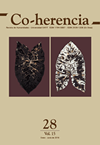Republic, freedom and democracy in Spinoza
Main Article Content
Keywords
Spinoza, freedom, republic, democracy, dutch republicanism
Abstract
The main objective of this paper is to show the value of reading Spinoza's political philosophy from a republican point of view. Spinoza’s political theory incorporates lexical elements, concepts and problems taken from republicanism, which he transforms according to the metaphysical foundations of his philosophy and the Dutch context of his time. We can understand better the sense and reach of such a theory if we locate Spinoza in the republican tradition. After a brief characterization of Dutch republicanism, the paper shows how the basic themes and concepts of republicanism are present in the Theologico-Political Treatise and the Political Treatise. It focuses, especially, on the concept of freedom, key for the proposal of a democratic republic.
Downloads
References
Bove, L. (2005). Politique: “j’entends par là une vie humaine”: Démocratie et orthodoxie chez Spinoza. Multitudes, (22), 63-76. doi:10.3917/mult.022.0063
Feuer, L. S. ([1958] 1987). Spinoza ad the Rise of Liberalism. New Brunswick/ Oxford: Transaction Books.
Field, S. (2012). Democracy and the Multitude: Spinoza against Negri. Theoria: A Journal of social and Political
Theory, 59(131), 21-40. doi: 3167/th. 2012.5913103
Haitsma Mulier, E. (1987). The language of seventeenth-century republicanism in the United Provinces: Dutch or European? En A. Pagden (Ed.), The Languages of Political Theory in Early-Modern Europe. Cambridge: Cambridge University Press.
Herold, A. L. (2014). Spinoza’s Liberal Republicanism and the Challenge of Revealed Religion. Political Research Quarterly, 67(2), 239-252.
Israel, J. (2001). Radical Enlightenment. Nueva York: Oxford University Press.
Martínez, F. J. (2005). Entre el mito bátavo y el mito de Venecia: identidad nacional y republicanismo en la Holanda de Espinosa. Isegoría, (33), 219-234.
Peña, J. (2011). Los estados, la guerra y la paz en Spinoza. En M. L. Ribeiro Ferreira (Coord.), Spinoza. Ser y agir (pp. 21-33). Lisboa: Centro de Filosofia da Universidade de Lisboa.
Peña, V. (1992). Espinosa. En V. Camps (Ed.), Historia de la ética, vol. 2 (pp. 108-140). Barcelona: Crítica.
Pocock, J. G. A. (2002). Spinoza y Harrington: una comparación. En Historia e Ilustración. Doce estudios (pp. 42-65). Madrid: Marcial Pons.
Prokhovnik, R. (2004). Spinoza and Republicanism. Basingstoke: Palgrave Macmillan.
Scott, J. (2002). Classical Republicanism in Seventeenth-century England and the Netherlands. En M. Van Gelderen, & Q. Skinner (Eds.), Republicanism: A Shared European Heritage, vol. 1 (pp. 61-81). Cambridge: Cambridge University Press.
Tatián, D. (2014). Spinoza, un realismo anómalo de la paz. Araucaria, (32), 93-109. doi: 10.12795/araucaria.2014.i32.05
Van Gelderen, M. (1990). The Machiavellian Moment and the Dutch Revolt: the Rise of Neostoicism and Dutch Republicanism. En G. Bock, Q. Skinner, & M. Viroli (Eds)., Machiavelli and Republicanism (pp. 205-223). Cambridge: Cambridge University Press.
Volco, A. (2011). Spinoza y el republicanismo. Res Publica, (25), 9-40. Disponible en http://revistas.ucm.es/index.php/RPUB/article/view/47801/0
Weststeijn, A. (2012). Commercial Republicanism in the Dutch Golden Age. The Political Thought of Johan & Pieter de la Court. Leiden/Boston: Brill.




